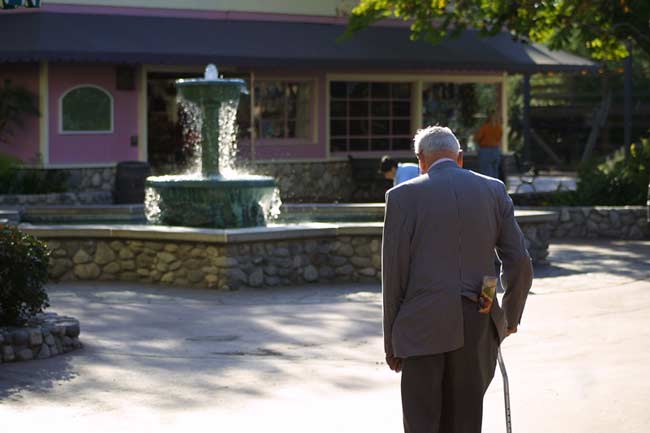Another Fountain of Youth Runs Dry

Growth hormones, the broadly touted fountain of youth for aging baby boomers, have proven themselves good at growing something after all: joint pain, carpal tunnel syndrome, male breasts, glucose intolerance, diabetes and cancer.
As researchers at Stanford University reported last week in the Annals of Internal Medicine, human growth hormone (hGH) is weak on benefits but heavy on side effects. Most of us would be better off skipping the treatment, which can cost thousands of dollars.
Hormone therapy, of course, is nothing new. Cocktails of hGH, testosterone and its chemical cousin dehydroepiandrosterone (DHEA) have long been the domain of bodybuilders. It's just that now they are now being repackaged as youth injections.
Scientists long figured the theory was too simple to be true. Their hunch was correct.
Time in a bottle
Human growth hormone is secreted by the pituitary gland to promote growth particularly during childhood and adolescence. Some children might require hormone injections if their pituitary gland is not functioning properly.
Once you stop growing, you don't have much need for the hormone, unless you want to look like the governor of California. For young adults, hGH and other male hormone injections can put on muscle mass when incorporated into a weight-training program. While there's a good chance this could keep you out of the Baseball Hall of Fame, the long-term health implications are unknown.
Get the world’s most fascinating discoveries delivered straight to your inbox.
The premise of anti-aging hormone therapy is that these hormones, plentiful in our younger years, all but evaporate as we age, so replacing them will restore youth. This is a terribly oversimplified and even dangerous idea.
Yes, there may be benefits for older people, both tantalizing and immediate. That's why some are willing to shell out thousands of dollars for routine injections. Some people lose fat, gain strength and improve their stamina. The Stanford study confirmed this, noting an average loss of 4.6 pounds of fat mass and a similar increase in lean body mass for seniors in their late 60s and early 70s.
The benefits sound oddly familiar—something that happens with exercise and a healthy diet, those mundane recommendations. Exercise would indeed be the wiser choice, the Stanford group said, finding no evidence to recommend hGH therapy
Hormone baggage
To sustain what you've gained from hGH, you have to keep up with the therapy. Hormones have short half-lives and need to be targeted (via injections, costing hundreds of dollars each) for maximum effect. Hormone "activators" and natural plant hormones sold as pills, powdered mixes and sprays in health food stores are cheaper than injections (only $50-100 a month) but may pass through the body largely unused.
But if your wallet holds out, your body may not. The Stanford study found side effects to be widespread, and these include man-boobs. That's not the youthful look these gents were after—at least for themselves. The hGH therapy did nothing for bone strength, which is what it is most often prescribed for.
It gets worse. Growth hormone fuels cancer in mice, as reported by Karoly Szepeshazi of the Tulane School of Medicine in 2001 in the journal Endocrinology. Apparently, hGH triggers the release of another hormone, IGF-1, known to stimulate cancer growth later in life. This "smoking gun" animal study confirmed the cancer-causing hGH-IGF1 pathway seen in numerous in vitro experiments.
There have been no human studies to document hGH's ability to extend life. In contrast, mice without growth hormone routinely live 30-50 percent longer than normal mice, and mice overproducing growth hormone live 30-50 percent shorter, according to Huber Warner of the National Institute on Aging.
It could be that the body is smart, shedding hGH later in life when it appears to do more harm than good. Why fight it?
Christopher Wanjek is the author of the books “Bad Medicine” and “Food At Work.” Got a question about Bad Medicine? Email Wanjek. If it’s really bad, he just might answer it in a future column. Bad Medicine appears each Tuesday on LIveScience.
- Special Report: Toward Immortality
- Trendy Hormone Treatments No Passage to Graceful Aging
- Magnet Therapy Proves Effective ... in Attracting Your Money
- Bad Habits: Why We Can't Stop

Christopher Wanjek is a Live Science contributor and a health and science writer. He is the author of three science books: Spacefarers (2020), Food at Work (2005) and Bad Medicine (2003). His "Food at Work" book and project, concerning workers' health, safety and productivity, was commissioned by the U.N.'s International Labor Organization. For Live Science, Christopher covers public health, nutrition and biology, and he has written extensively for The Washington Post and Sky & Telescope among others, as well as for the NASA Goddard Space Flight Center, where he was a senior writer. Christopher holds a Master of Health degree from Harvard School of Public Health and a degree in journalism from Temple University.
 Live Science Plus
Live Science Plus





